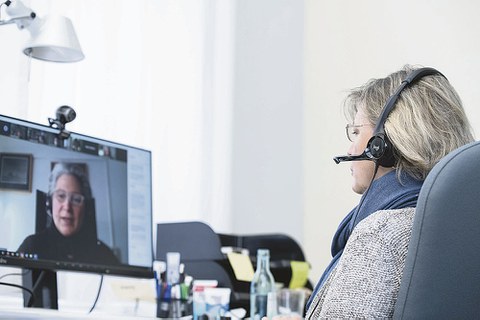Feb 09, 2021
Shaping the future of TU Dresden efficiently and ethically

Appropriately, the future laboratory took place in digital format.
The mixture of participation and reception in the digital future laboratory "How do we want to research?" Was a great success. Thanks to a smooth technical concept, 187 participants were beamed from one virtual room to the next in order to exchange topic-related experiences and creative ideas. In response to a greeting from the rector Prof. Ursula M. Staudinger, the event manager Prof. Angela Rösen-Wolff summed up the strategic goal of the research: increased interdisciplinarity, closer links to the medical campus, the philosophical faculty and the DRESDEN-concept partners as well as more excellent clusters. After a brief conversation with the participants, the helpdesk assigned them to their topic groups.
"Research Ethics" with Prof. Gerhard Rödel (Professorship for Genetics) and Dr. Katrin Jordan (Head of Department 5) discussed the creation of a commission for responsible research and dealing with freedom and risks in research. In this context, a need for transparent discussion platforms became clear. It is important to call on the responsibility of the TUD, because violations of ethical principles fall back on the entire institution.
In the keynote lecture on the topic of "Good Scientific Practice", Dr. Barbara Könczöl (head of the Graduate Academy) and Prof. Christel Baier (holder of the professorship for algebraic and logical foundations in computer science; ombudsperson of TUD) the 2019 stricter guidelines of the DFG Code. In the discussion, possible course contents were specified: the problem is the added value that results from violations. Prof. Daniel Leising (holder of the Professorship for Diagnostics and Intervention): »On the other hand, there needs to be independent bodies capable of sanctioning which one is absolutely afraid.« Prof. Dominik Schrage (holder of the Professorship for Sociological Theories and Cultural Sociology) mentioned the internal perspective: » Instead of a normative ›you shouldn't‹, the impulses and situations of these people have to be reflected in order to develop possible solutions.
"Research data management" was a top priority for CDIO Prof. Lars Bernard and Dr. Ralph Müller-Pfefferkorn (Head of Distributed and Data-Intensive Computing at the ZIH). For productive handling of the collected data, legal questions must be clarified in the subject-specific teaching and advice. In particular, the participants of the DRESDEN-concept partners expressed their interest in forming an overarching analysis group.
DRESDEN-concept partners were also attracted to the "Open Science" group. Due to great demand, this offer was doubled at short notice: In addition to Prof. Stefan Scherbaum (Open Science Initiative of the Faculty of Psychology) and Dr. Julia Meyer (knowledge manager for the humanities and social sciences at SLUB) hired Dr. Andreas von der Dunk (Research Data Management at SLUB) and Dr. Denise Dörfel (Professorship for Differential and Personality Psychology) the sixfold implementation of this topic circle. What was striking was the heterogeneous knowledge of open science that was shown in the audience. “There has to be a central point of contact for Open Science that also trains,” summarized Prof. Scherbaum. This was followed by a lively discussion: “Society is needed for our research data to be relevant. At the same time, however, it takes vague data out of our hands, ”said Prof. Thomas Köhler from the media center. This gave rise to ideas about our own publishing houses in cooperation with the SLUB or for interdiscourse with the public. All discussion groups said that support offers for qualification and quality assurance are necessary when working with Open Science.
The topic group had an informative character through the research information system of the TUD. Prof. Friedrich Funke (holder of the professorship for educational sciences with a focus on quantitative methods) and Dr. Anita Sbalzarini (Head of Research Information) presented the PURE database. Technical needs of the listeners: inside - the transfer of old data and access for administrative staff: inside - illustrated the main points. In contrast, inquiries about data protection in the commercial system and its mandatory use reflected an ambivalent consensus. Another impulse was to involve external partners in the FIS.
In the "performance-oriented allocation of funds" in the thematic group of Prof. Stefan R. Bornstein (Director of the Medical Clinic and Polyclinic III and the Center for Internal Medicine) and Dr. Sacha Hanig (Head of Research Funding) showed that the heterogeneity of specialist cultures makes it difficult to unite actors under one yardstick on an equal footing. “If you want to be global, it is worth using the indicators of global universities. In the UK, the quality of just five publications is often assessed, ”said Dr. Hanig on the evaluation parameters.
The development of trustworthy discussion offers and their visibility were the quintessence of the event. Prof. Angela Rösen-Wolff had the closing words: »We will develop measures based on your impulses that will move us forward. It'll be a challenge, but it's worth it. This is the only way we can move forward. I see this day as a great success."
